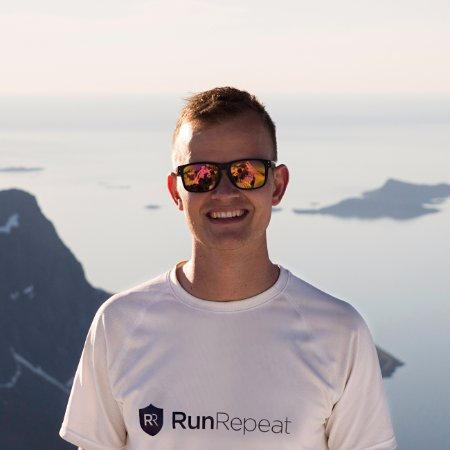Expensive Running Shoes Are Not Better Than More Affordable Running Shoes (Study)
Based on 134,867 reviews of 391 running shoes from 24 brands, this study compare the list price of running shoes with how well rated they are. The key conclusion is that expensive running shoes are not better than more affordable ones. In fact, inexpensive running shoes are better rated than expensive ones.
Feel free to use any content (graphics, comments etc.) as long as you refer to this original source. For interviews, please reach out at jens@runrepeat.com.
Conclusions first
Based on 134,867 reviews and 391 running shoes from 24 running shoe brands:
- The higher the list price, the lower ratings the running shoes get.
- The 10 most expensive running shoes (avg. list price: $181) are rated 8.1% worse than the 10 cheapest running shoes (avg. list price: $61).
- Running specialist brands are rated 2.8% higher than running shoes from broad sports brands.
- The top three best rated brands are: #1 Skechers, #2 Saucony and #3 VibramFiveFingers, while the three worst rated are #22 New Balance, #23 Adidas and #24 Reebok. Adidas Group owns both Reebok and Adidas.
- The three most affordable brands are #1 Skechers, #2 Vivobarefoot and #3 PUMA, while the three most expensive brands are #22 On, #23 Newton and #24 Hoka.
Background information
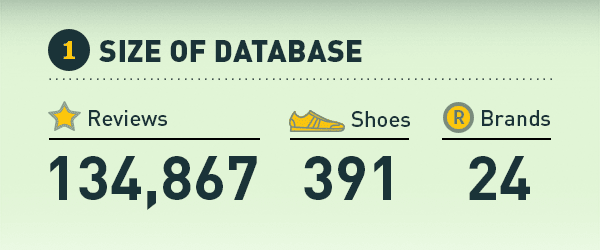
RunRepeat.com is an ad- and costfree platform where runners and experts review running shoes, sneakers and other athletic footwear. Our mission is to create transparency in the running shoe market. We do that by giving runners free access to aggregated information on reviews, comparisons and rankings of running shoes .
We are 100% independent. We do not recommend any shoes, brands or stores ourselves, but let the community be the judge of which running shoes are great and which to avoid, whether that be road, trail or treadmill running shoes.
"We did this study to spread the word that 'the higher the list price the more value' does not apply to running shoes'" says Jens Jakob Andersen the founder of RunRepeat.com. He says: "Brands have strong incentives to promote highend running shoes, but our study very clearly outlines that runners buying more expensive running shoes are less satisfied than runners buying mid-range or cheap running shoes."
Methodology
The following process is the foundation of our results:
- We compiled 134,867 user reviews from 391 running shoes at RunRepeat
- We compiled list prices from 24 brands on the same shoes
- We made a regression on the two variables
Results
The results are categorized into:
- Shoe specific results
- Brand specific results
Running shoe specific: comparing 391 running shoes
Below is a plot of 391 running shoes on two parameters: list price in US-dollars on the x-axis and the average user rating from 0-100 on the y-axis.
The data is randomly plotted, which is the core of our conclusion - there is no statistical correlation between the list price of a shoe and how well rated it is. Actually, if you do a regression analysis, the data suggest that cheaper running shoes are higher rated than expensive ones.
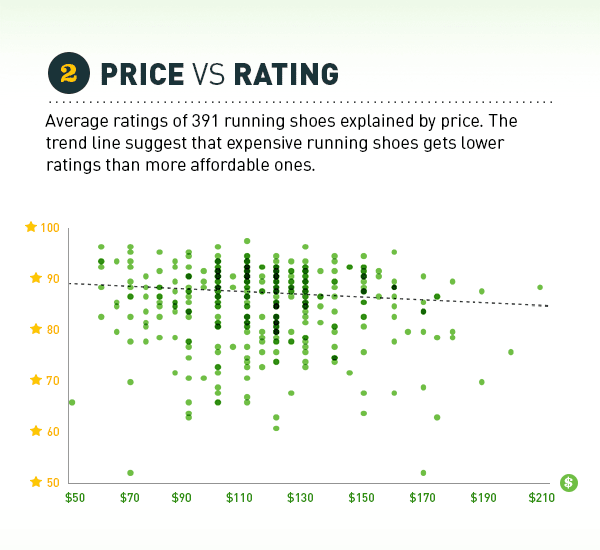
We dug deeper and looked at the 10 most expensive running shoes and the 10 cheapest running shoes. In this case the results are surprising. The 10 cheapest shoes had an average list price of $61 with an average user rating score of 86 out of 100. If you look at our ranking list of the best rated running shoes, you will see that only 18.9% of all 391 running shoes are rated better than the 10 cheapest ones are on average. In other words, the average running shoe is worse rated than the cheapest ones.
Further, if you look at the 10 most expensive running shoes, which are meant to be top premium running shoes, the runners are not satisfied to the same degree as with the cheaper shoes. With a price 3x higher, the premium running shoes makes runners 8.1% less satisfied and 6.0% less satisfied if you compare it to the average rating of all 391 running shoes.
"People buy three times as expensive running shoes to get 8% less satisfied." says Jens Jakob Andersen, the founder and CEO of RunRepeat.com.
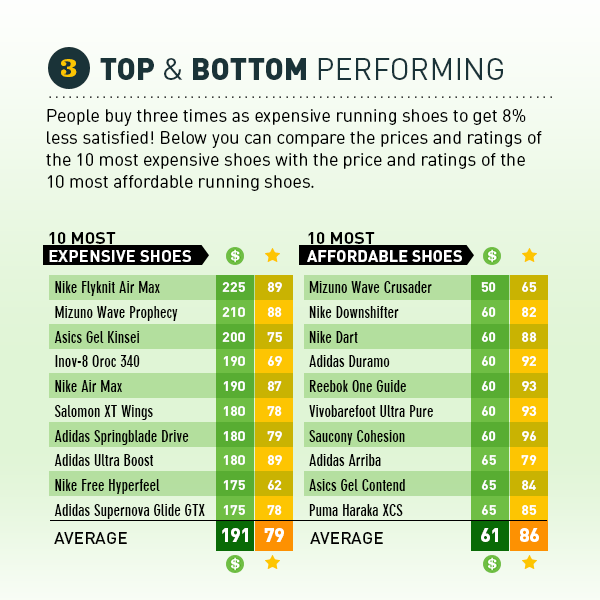
We even looked at the top 30 running shoes and the bottom 30 running shoes and the results are the same. Expensive running shoes are getting lower ratings: "runners are being less satisfied with premium running shoes. I am aware that higher prices set higher expectations, but in any case the price should reflect the quality of the product and thereby the ratings." Jens Jakob Andersen says.
Brand specific: comparing 24 running shoe brands
In this section we focus on the division of running shoe brands, and not specific models as previously discussed. This is not to promote any specific well-performing brands. We have no incentives in this study other than sharing knowledge with consumers.
Below you will find a chart plotting the average rating (y-axis) against the list price in US-dollars (x-axis). As with the specific running shoe models, the higher the list price, the lower the rating. In fact, if you do a correlation it suggest that a $50 increase in the list price of a shoe would cause a 1.4 lower average rating of the shoe.
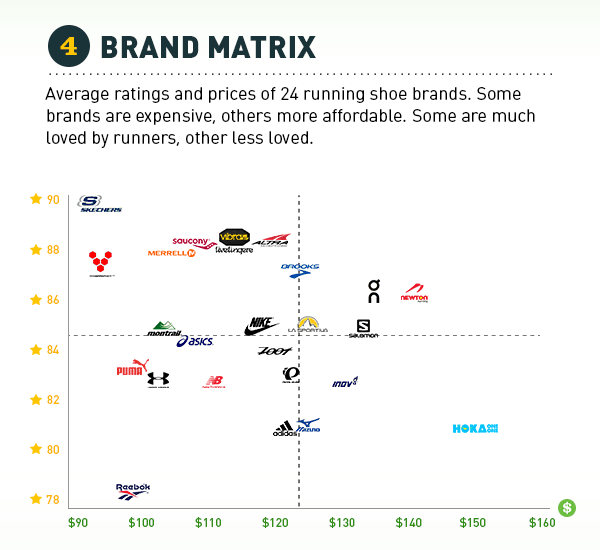
Some brands are great at marketing, some are great at creating lovable running shoes, and some are great and combining great marketing with great product creation. The chart below illustrates the average user rating for each of the 24 running shoe brands.
"We expected specialist running brands to outperform standard sports brands significantly, but looking at the data, there's only a small difference. Running specialist brands perform 2.8% better than general sports brands." says Jens Jakob Andersen.
Also, the second bar chart below illustrating the average list price on 24 different running shoe brands.
"There is nothing wrong with a company selling premium running shoes, but in my honest opinion, it is a problem when a running shoe brand spends massive amounts of money on marketing to promote products consumers dislike." Jens Jakob Andersen says.
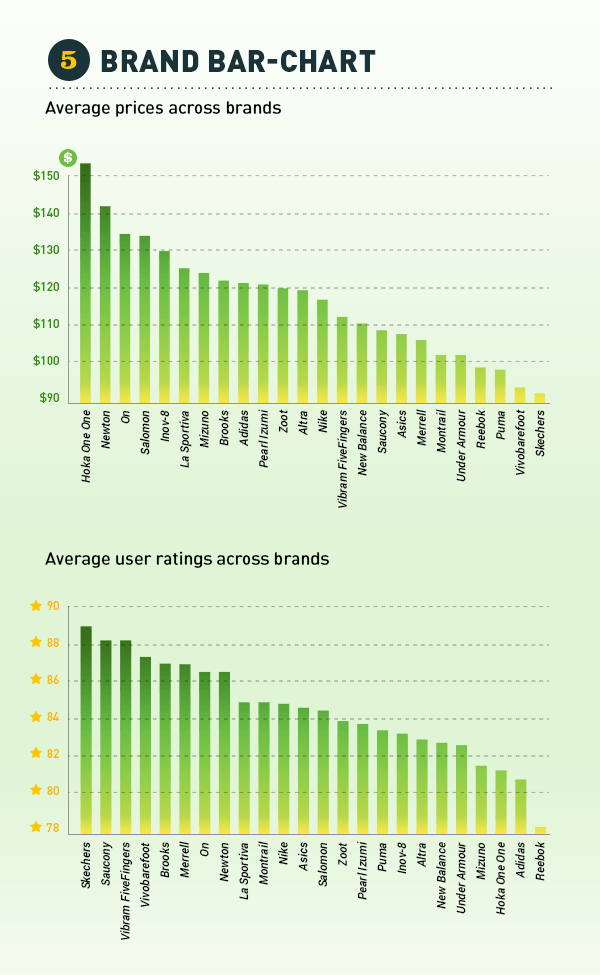
Potential biases that influence results
No study is perfect. Here are some pitfalls of this study:
- One might expect that if a runner buys and expensive shoe, he will have higher expectations for the quality of the shoe and therefore he will more easily get disappointed. True, the more you spend, the more you expect. Though, the list price should reflect expectations. If you spend more on a running shoe, you would logically expect to get a better product.
- The reviews are from the aggregator RunRepeat.com, which attracts a certain type of runner, which might bias results (in both directions).
That being said, we still believe our conclusion is right put, and that the potential biases have not influenced the data in any very significant direction.
About the researchers
Jens Jakob Andersen is the lead researcher behind the study. He is a former competitive runner who still loves to get out there in his trail running shoes and teacher in statistics at Copenhagen Business School under Center Chief of the Department of Finance Dorte Kronborg. Today he is the founder and CEO of RunRepeat.com. The study was assisted by the Polish statistician Wojciech Fedyszyn and reviewed by dozens of experts before being published. The study was funded by RunRepeat.com
Disclaimer: no brand or other institution influenced us in any way to do this study. We did it in our search to create transparency in the running shoe market, and not to promote well-performing running shoe brands. No brands even knew we did this study.
Feel free to use any content as long as you refer to the original source. For interviews, please reach out at jens@runrepeat.com, +45 29 29 29 58 or check the contact page.
Below is the full infographic. You can download it in 600px or 1200px. We are happy to share our raw data - if interested, reach out.

